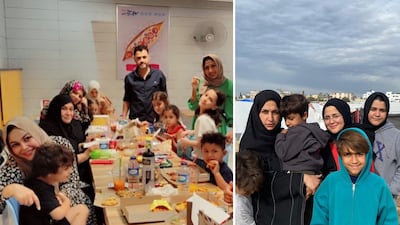Live updates: Follow the latest on Israel-Gaza:
When Mohammed Abou Foul’s four-year old daughter asks about the dolls she left behind in Gaza, he is reminded of the difficult decision he and his wife made to flee in November last year.
Mr Abou Foul, who is a British national and a lecturer in engineering, was evacuated along with 17 members of his family, including his parents, his siblings and children. Three weeks later, they landed in the UK.
Though he had lived and worked in the UK before, his family had not.
Now living in Birmingham, they are settling in to to their new lives. “My daughter wants to go play in the backyard of our home in Gaza. She still remembers the house and her dolls. This will not go away with time, she will always remember,” he said.
“My fear is how will I explain to my children that we took the decision to leave, to bring them here, to a place where they don’t have a connection to their roots,” he said.
He will return to Gaza one day, he says, but not to live there with his family. “It’s not a healthy place for my family in the foreseeable future,” he said.
“We lost everything, but we can’t look back. We have to stay focused on our new reality,” he said.
Since months into the war, the UK government is under increasing pressure to end its arms sales to Israel.
Three Supreme Court justices were among the 600 legal experts who signed an open letter to the Prime Minister on Thursday, calling for weapons sales to end. The letter said the UK risks breaking international law over a “plausible risk of genocide in Gaza.”
Hamas’s infiltration and attacks in Israel on October 7, in which 1,200 people were killed and more than 240 taken hostage, triggered the war in Gaza.
More than 33,000 Palestinians have been killed since, according to the Gaza Health Ministry, with tens of thousands more injured.
The vast majority of Gaza’s 2.2 million residents have been displaced, with most of them sheltering in the southern city of Rafah – which has now also come under siege.
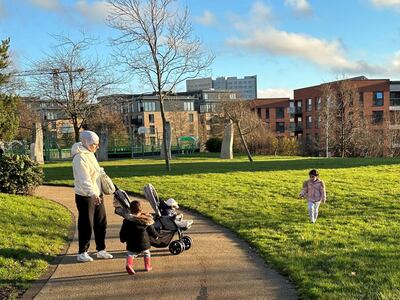
The killing of seven aid workers from the World Central Kitchen by Israeli strikes on Monday has prompted two aid agencies, including WCK, to withdraw from Gaza for security reasons.
Humanitarian agencies have called for an immediate ceasefire to allow their staff to operate as famine looms and disease spreads.
Starting from scratch
Shortly after arriving in the UK, Mr Abou Foul found work as a university lecturer.
He and his wife spend much of their time filling out forms, so that they can register their children with a GP, find them a school, and move house. “We are starting from scratch. We came here with nothing, we left everything in Gaza,” he said.
His wife, a dentist, is not yet able to practice in the UK, because all of the official papers required to convert her qualifications are in Gaza. The university she graduated from, Al Azhar, was partially destroyed by Israeli strikes in November.
“She needs papers from Gaza but she can’t access them, or access references from the university or regulatory bodies. There is no one to contact, her old colleagues may be dead,” he said. “There is a lot of uncertainty in this process”.
His parents, who live nearby, have struggled to adapt to their new lives. “They stay all day in the house. It’s difficult for them to adapt to the new reality,” he said.
Back in Gaza, his parents had been doctors. His mother went to her gynaecology practice every morning and his father continued to see urology patients.
Mr Abou Foul was grateful to the British government who evacuated his family. “The Home Office and Foreign Office have been fantastic. We had the right support when we needed it,” he said.
More follow-up support was needed, he added, to help integrate families into the system. His siblings and brother-in-law were also looking for work, and some members of his family are applying for visas to extend their stays in the UK.
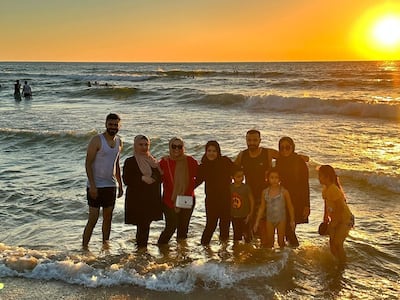
Evacuating loved ones to Egypt
With the Israeli military closing in on Rafah – the last place of refuge in Gaza – many British Palestinians are travelling to Egypt to help family members flee.
Narmin El Gabbour, a pharmacist based in the UK, recently returned from Egypt after spending weeks evacuating her brother, his wife and their newborn baby.
The baby, who was born a few weeks into the war, had become very ill and was showing signs of dehydration, prompting Ms El Gabbour to make the urgent trip to Cairo.
Evacuation for Palestinians is facilitated by an Egyptian travel agent, which charges from $5,000 per adult, and $2,500 per child.
Ms El Gabbour recalled scenes of chaos outside the travel agent’s offices, where she waited for days outside to be let in.
She was made to pay an additional sum just to enter the office so that she could register her brother Bahaa and his family’s name.
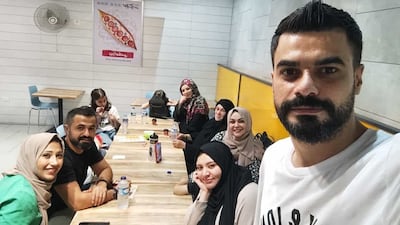
When Baha’ arrived in Cairo two weeks later, Ms El Gabbour found him changed.
“The first time I saw him, he was a completely different person. He looked older, he is 34 but looked like he was 60,” she said.
He was thin, and when he ate, he did not care how the food tasted, and was just grateful to have food, she recalled.
Though Baha’ had fled the bombings in Gaza, he was still thinking of the family he left behind and the homes they lost.
“My brother and his wife are not a happy family, they are traumatised. They are more than sad, and more than angry. They asked me, why did this happen to us? In just one second everything was gone,” she said.
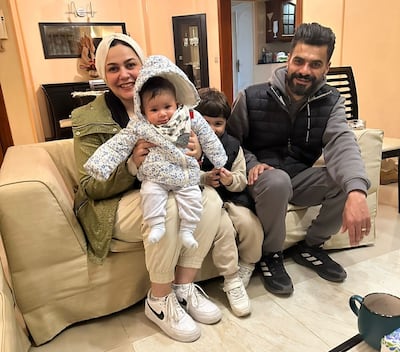
Back in the UK, Ms El Gabbour spends a lot of her time waiting for news from her other siblings and her father, who are scattered around shelters and camps.
Her voice is weak when she speaks and she cries often. Her husband – an NHS paediatrician – and daughter are doing what they can to comfort her.
A couple of weeks ago, with the help of her daughter, Ms Al Gabbour set up an online fundraiser to pay the hefty evacuation fees for the remaining members of her family.
Among them is her nephew Sulaiman, who is six years old and autistic. “He can’t sleep, he is afraid all the time, holding on to his mother,” she said.
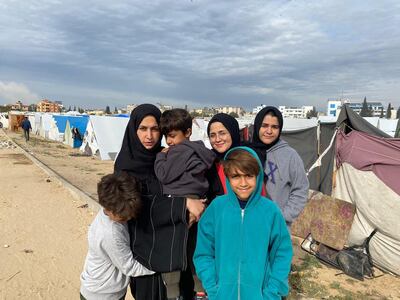
She urged the UK government to set up a scheme which would allow British Palestinians to evacuate their families from Gaza.
Similar calls have been made for a scheme that would mimic the ones established for Ukrainians and Afghans.
“I’m British, I just want my family to be safe. They don’t have to come to the UK, we just need to put their names at the border,” she said.
“There’s no life for me if I lose my family,” she added.
“Why should I pay this huge amount of money? Why do I need to set up a GoFundMe and go asking to all these people for help,” she said.
“There is nothing I can do to help them if I can’t evacuate them. Where should they go? Nowhere is safe,” she said.
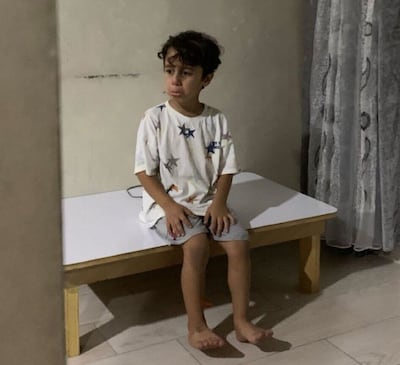
Watching the humanitarian crisis unfold
Nothing could have prepared Mr Abou Foul for the humanitarian crisis unfolding today in Gaza, where one in three children under two are acutely malnourished according to the World Food Programme.
The conditions in Gaza had been bad enough when they fled in November, he told The National.
His family began moving south a week into the war, but were displaced five times as Israeli air strikes kept drawing closer.
With eight children to take care of between himself and his siblings, they struggled to find the right food, baby formula and nappies. “Hygiene was low, most of the children got bacterial infections,” he said.
“It wasn’t that bad (in November) when I look back on it now. We were in the honeymoon period of the war,” he said.
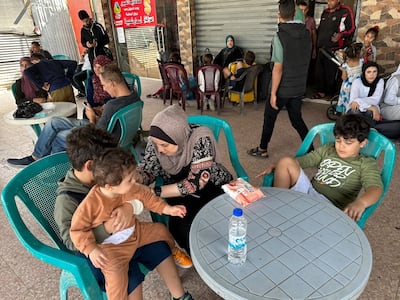
Once evacuation became possible, the family made almost daily trips to Rafah in the hope that their names would be at the border. “It was a nightmare. Every day at 5am we packed our stuff, and got the kids ready,” he said.
Now in Birmingham, his daughter still talks of the air strikes they fled in Gaza. “I told her they were fireworks. But she understood it wasn’t right,” he said.
In west London, Fares Abu Warda, a legal consultant, remembers with fear how he struggled to get his wife and five children – all British nationals – out of Gaza.
He spent days trying to secure a safe vehicle for his family, to drive them from Jabaliya in northern Gaza to the Rafah crossing. For this, he contacted the FCDO with help from his local MP, and eventually he flew to Cairo.
When no vehicle came, the family walked for hours through the so-called safe passage from northern Gaza to Deir Al Balah, from which they were brought by horse and cart to Rafah. Those who made the perilous journey through the corridor told The National how they walked among corpses.
It took two months for Mr Abu Warda's children to get medical check-ups after their return from Gaza, he said.
Since then, Mr Abu Warda has been on the phone seeking news of his remaining family, arranging evacuations, or sourcing donations to send aid back to Gaza.
Over the past couple of months, he and others have helped restart a well near his home in Jabaliya.
The well’s owners had been unable to pump water owing to fuel shortages and rising costs. While it previously cost $300 to pump around 120 gallons of water, the cost of the fuel for the same amount had risen to $1,500, Mr Abu Warda said.
After raising the necessary funds abroad, they transferred the money to Gaza through several intermediaries, including a Jordanian who has money stuck in a Palestinian bank. For every $1,500 raised, 60 families were given two gallons of water, which would last them three days for drinking, cooking and he said.
“We are individually more effective than aid agencies. We know the people (in Gaza). If someone is concerned about the donation, we can show them the records,” he said.
With ceasefire talks repeatedly stalling, Mr Abou Foul said he prays for peace. "The war will exhaust itself regardless of whether they reach and agreement or not."
"The people of Gaza were the collateral damage. The biggest victims will be the kids. I pray for peace," he added.
